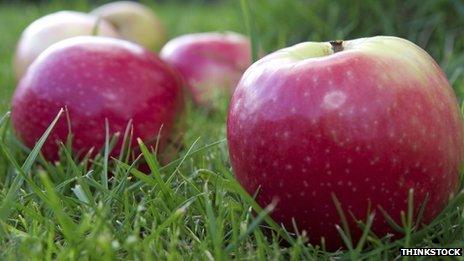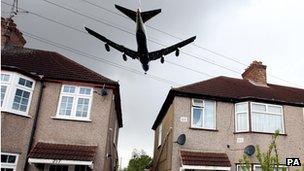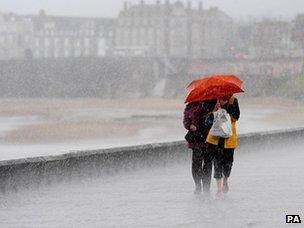Could it actually rain apples?
- Published

Apples - from a tree, not from the sky
There are reports that a deluge of apples fell from the sky in Coventry, battering car bonnets and littering people's gardens. But could it actually rain apples?
Everyone has heard the expression it's raining cats and dogs. But in Coundon in Coventry the allegation is that it rained apples.
Drivers say scores of small green ones brought traffic to a standstill on the B4098, while a resident told the Daily Mail he opened his front door, external to find his garden full of dented apples.
There is no other evidence that it did actually "rain apples", but it would not be the first time that strange items have dropped from the sky.
Many of the biblical-sounding stories involve fish and frogs. One of the earliest accounts of frog and fish storms was given by the Roman writer Pliny in his Natural History written during the 1st Century AD.
One story from 1859 tells of two showers at 10-minute intervals covering a part of Aberdare in live minnow and smooth-tailed sticklebacks.

Could the apples have fallen from a plane?
Frog falls were recorded in Llanddewi, Powys, in 1996 and two years later in Croydon, south London. In 2000, hundreds of dead silver sprats fell out of the sky during a rainstorm in the seaside resort of Great Yarmouth.
There have also been maggot downpours - in Acapulco in 1967 and during a yachting event at the 1976 Olympic Games.
Such freak events have been attributed to a rare but not uncommon weather phenomenon. Given strong enough winds, in thunderstorms for example, small whirlwinds and mini-tornadoes may form.
If the storm brews out at sea, or crosses a river, these can scoop up water and small fish swimming close to the surface. Sooner or later, the clouds carrying them will open and drop their strange cargo.
Cars and houses have been swept up by tornadoes, so apples are well within the realms of possibility, says Dr Lisa Jardine-Wright, a physicist at the Cavendish Laboratory, based at Cambridge University.
"A tornado which has swept through an orchard will be strong enough to 'suck up' small objects like a vacuum [cleaner]. These small objects would then be deposited back to earth as 'rain' when the whirlwind loses its energy."
There are other theories surrounding the apples, such as the notion that they could have fallen from a plane.
But why would anyone do that? Falling off the back of a lorry would be a more plausible explanation.
Scientists would need to analyse the state of the apples and assess the damage in order to try to determine the source, says Dr Jardine-Wright.
"By comparing this damage with a series of experiments, we would be able to determine how much energy and momentum the apples had when they collided.

The weather was not stormy over Coventry when the apples supposedly fell
"However, as objects fall they eventually reach a maximum (terminal) velocity after which they accelerate no more - an apple falling from more than about 20m has reached this maximum velocity so broadly speaking any apple falling from above this height would cause approximately the same amount of damage.
"Therefore without further information, for example weather conditions, direction of fall etc. it is difficult to scientifically distinguish their source."
At the time the apples supposedly fell from the sky, it was pretty calm over Coventry, according to the BBC Weather Centre. The Met Office says there were no reports of tornadoes in the area.
Dr Curtis Wood, a meteorologist from the University of Reading, says that while the UK often tops world rankings in terms of the number of tornadoes per square kilometre - in total around 10 to 50 tornadoes per year - they tend not to be very strong.
If there had been a tornado in Coventry, he says, it would have needed to have found a box of apples or an orchard within a few hundred metres of where the apples were found.
"The tornadoes don't get very strong and they are not going to transport items very far."
It is not the first apple shower to be reported in the UK, according to Paul Sieveking, co-editor of the Fortean Times, a magazine dedicated to the world of strange phenomena.
In November 1984, 300 apples - of the Bramley and Cox varieties to be precise - landed in a back garden in Accrington, Lancashire.
"The couple woke up to a thunderous noise and thought it was hail. The apples kept on falling for an hour, so it could not have been a plane."
Reluctant to guess the source of the Coventry apples, Sieveking says he is tolerant of uncertainty and human beings love a good puzzle.